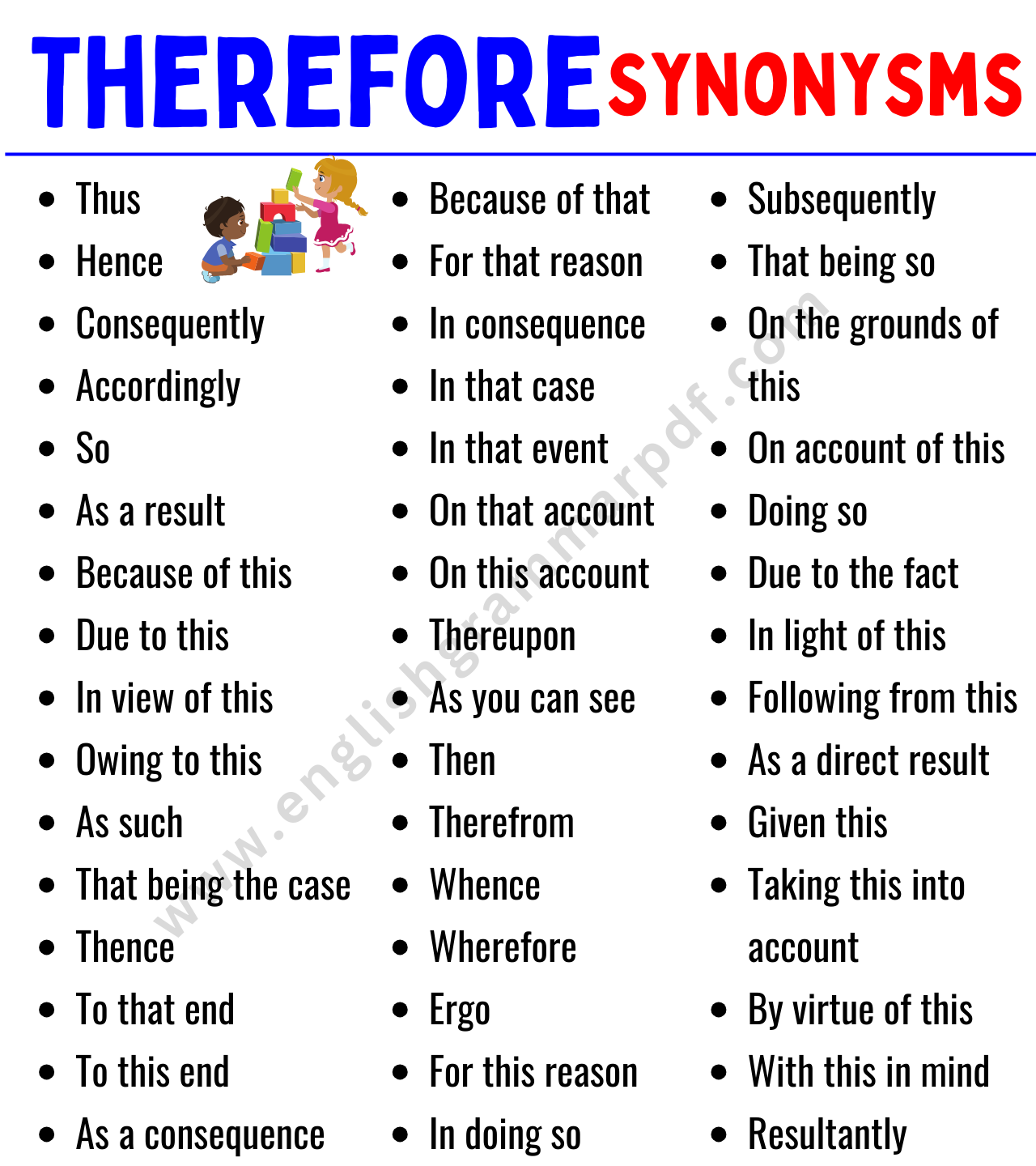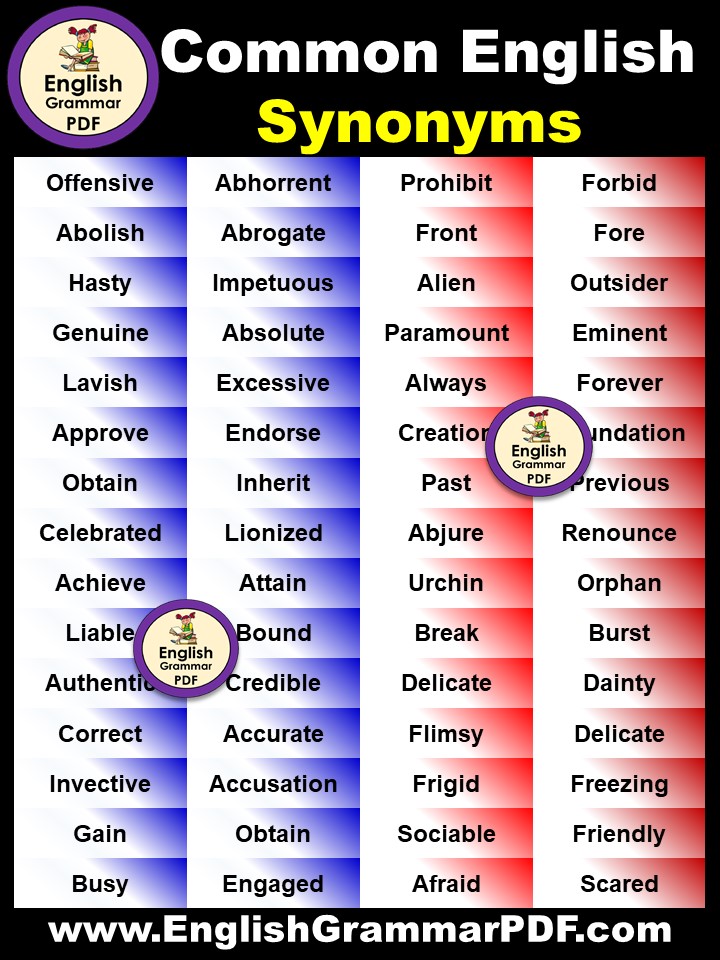When we talk, write, or think, we often need to explain why something happens or the result of something. It’s like when you put seeds in the ground, water them, and then plants grow. We need words to connect the “planting and watering” part with the “growing plants” part. The word “therefore” is a bridge that helps us do just that. But there are many other bridges or words that can help us make this connection. Let’s explore some of these words, so we can use them in our sentences and make our English even better!
THEREFORE Synonyms List
- Thus
- Hence
- Consequently
- Accordingly
- So
- As a result
- Because of this
- Due to this
- In view of this
- Owing to this
- As such
- That being the case
- Thence
- To that end
- To this end
- As a consequence
- Because of that
- For that reason
- In consequence
- In that case
- In that event
- On that account
- On this account
- Thereupon
- As you can see
- Then
- Therefrom
- Whence
- Wherefore
- Ergo
- For this reason
- In doing so
- Subsequently
- That being so
- On the grounds of this
- On account of this
- Doing so
- Due to the fact
- In light of this
- Following from this
- As a direct result
- Stemming from this
- Given this
- Taking this into account
- By virtue of this
- With this in mind
- In consideration of this
- Resultantly
- As an outcome
- By reason of this

1. Thus
“Thus” is a way to say “because of this” in a smart way. It helps us show that one thing is the reason for another. Example: “He didn’t study; thus, he didn’t pass the test.”
2. Hence
“Hence” is like a fancy version of “so”. It’s used when you want to sound a bit more formal or smart. Example: “It was raining hard; hence, the match was postponed.”
3. Consequently
“Consequently” is a longer word that means “as a result”. It’s used when you want to highlight the outcome of a situation. Example: “They worked hard all year; consequently, they won the championship.”
4. Accordingly
“Accordingly” means “in a way that is appropriate to what is being done or said”. It’s like saying “so, this is what we did”. Example: “The plan was risky; accordingly, they proceeded with caution.”
5. So
“So” is a simple and very common way to connect a cause with its effect. It’s easy and everyone understands it. Example: “He was hungry; so, he ate a sandwich.”
6. As a result
“As a result” is a clear way to say “this happened because of that”. It’s straightforward and easy to use. Example: “The road was icy; as a result, driving was dangerous.”
7. Because of this
“Because of this” directly links two things, making it clear that one caused the other. Example: “The heater was broken; because of this, the house was cold.”
8. Due to this
“Due to this” is a formal way to explain that something happened as a direct result of something else. Example: “Due to this new law, many people changed their habits.”
9. In view of this
“In view of this” is a formal phrase that means “considering this fact”. It’s used to introduce a conclusion or result. Example: “In view of this evidence, the verdict was not guilty.”
10. Owing to this
“Owing to this” is similar to “because of this”. It’s another formal way to link causes and effects. Example: “Owing to this mistake, the entire project was delayed.”
11. As such
“As such” is a way to say “because of that reason”. It’s often used to wrap up an explanation. Example: “The solution was not feasible; as such, it was discarded.”
12. That being the case
“That being the case” is a phrase used to say “since this is true”. It leads to a conclusion based on the previous information. Example: “The roads are blocked; that being the case, we’ll have to find another route.”
13. Thence
“Thence” is an old-fashioned or formal word that means “from that place or point”. Example: “He moved to Paris and thence to Rome.”
14. To that end
“To that end” is used when you’re doing something for a specific purpose or result. Example: “To that end, they launched a new marketing campaign.”
15. To this end
“To this end” is similar to “to that end” and is used to introduce actions taken to achieve a goal. Example: “To this end, the school introduced new teaching methods.”
16. As a consequence
“As a consequence” means “as a result”. It’s another way to show the outcome of a situation. Example: “He overslept; as a consequence, he missed his train.”
17. Because of that
“Because of that” directly links a cause to its effect, making the relationship clear. Example: “The show was cancelled; because of that, we went home early.”
18. For that reason
“For that reason” is used to explain why something was done or happened. Example: “The path was slippery; for that reason, we walked carefully.”
19. In consequence
“In consequence” is a formal way of saying “as a result”. It’s used in more serious or formal situations. Example: “The company failed to adapt; in consequence, it went bankrupt.”
20. In that case
“In that case” is used when a particular situation leads to a specific action or result. Example: “If you’re not going; in that case, I’ll stay home too.”
21. In that event
“In that event” is similar to “in that case” and is used to specify what should happen if a certain situation occurs. Example: “In that event, we’ll need to reschedule the meeting.”
22. On that account
“On that account” means “because of that reason”. It’s another way to explain the cause of an action or event. Example: “He was the expert on the topic; on that account, he was invited to speak.”
23. On this account
“On this account” is used in a similar way to “on that account” and links a reason with an action or decision. Example: “On this account, we have decided to increase our budget.”
24. Thereupon
“Thereupon” means “immediately or shortly after that”. It’s used to show a quick reaction or result. Example: “He heard the news and thereupon decided to leave.”
25. As you can see
“As you can see” is a phrase used to draw attention to a result or conclusion that is evident from the information given. Example: “The garden is blooming beautifully; as you can see, our efforts paid off.”
26. Then
“Then” is used to indicate what happens next or as a result of something. Example: “First, we mix the ingredients; then, we bake the cake.”
27. Therefrom
“Therefrom” is an old-fashioned or formal way to say “from that place or source”. Example: “He borrowed a book and learned much therefrom.”
28. Whence
“Whence” means “from what place or source”. It’s an older or more formal word. Example: “He returned to his hometown, whence he had left years ago.”
29. Wherefore
“Wherefore” means “why” or “for what reason”. It’s an old-fashioned way to ask about the cause of something. Example: “He pondered the reason wherefore the decision was made.”
30. Ergo
“Ergo” is a fancy or formal way to say “therefore”. It’s often used in philosophical or serious discussions. Example: “All men are mortal; Socrates is a man; ergo, Socrates is mortal.”
31. For this reason
“For this reason” is used to explain why something is done or happens. It’s a clear way to link a cause to its effect. Example: “The area is protected for wildlife; for this reason, camping is not allowed.”
32. In doing so
“In doing so” is used to refer to the action that has just been mentioned and its outcomes. Example: “She donated generously; in doing so, she helped many in need.”
33. Subsequently
“Subsequently” means “after something else”. It’s used to talk about events that happen after the first event. Example: “He won the award and subsequently received many job offers.”
34. That being so
“That being so” is another way to say “because that is the case”. It’s used to introduce a consequence or next step. Example: “The roads were blocked; that being so, the event was postponed.”
35. On the grounds of this
“On the grounds of this” is a formal way to say “because of this reason”. It’s often used in legal or formal texts. Example: “On the grounds of this evidence, the case was dismissed.”
36. On account of this
“On account of this” is similar to “because of this”. It’s a formal way to link a cause and its effect. Example: “On account of this discovery, the scientist won an award.”
37. Doing so
“Doing so” refers back to an action that was just mentioned, emphasizing the act and its implications. Example: “By sharing his story, and doing so courageously, he inspired many.”
38. Due to the fact
“Due to the fact” is a more formal way to say “because”. It’s often used in writing to explain reasons. Example: “Due to the fact that it was raining, the picnic was moved indoors.”
39. In light of this
“In light of this” is used to introduce a statement or action that is influenced by the information just mentioned. Example: “In light of this development, we need to reconsider our strategy.”
40. Following from this
“Following from this” means “as a result of this”. It’s used to link a conclusion directly back to the preceding information. Example: “Following from this success, the team planned their next project.”
41. As a direct result
“As a direct result” emphasizes that one thing directly causes another. It’s used to highlight a clear and direct link. Example: “As a direct result of his dedication, he achieved great success.”
42. Stemming from this
“Stemming from this” means “originating from this”. It’s used to show the source of an outcome or situation. Example: “Stemming from this decision, a series of events unfolded.”
43. Given this
“Given this” is used to introduce a conclusion or statement that is based on the information just provided. Example: “Given this information, we must act cautiously.”
44. Taking this into account
“Taking this into account” means considering the information or situation when making a decision or conclusion. Example: “Taking this into account, the committee made its final decision.”
45. By virtue of this
“By virtue of this” means “because of this particular reason or fact”. It’s a formal way to explain the cause of something. Example: “By virtue of this innovation, the company gained a competitive edge.”
46. With this in mind
“With this in mind” is used to suggest that the information just mentioned should be considered when thinking or deciding about something.
Example: “With this in mind, we planned a more inclusive event.”
47. In consideration of this
“In consideration of this” is a formal way to say “taking this into account”. It’s often used when a decision is influenced by certain factors.
Example: “In consideration of this request, we have decided to extend the deadline.”
48. Resultantly
“Resultantly” is a less common way to say “as a result”. It’s used to introduce an outcome or effect.
Example: “Resultantly, the project was completed ahead of schedule.”
49. As an outcome
“As an outcome” is used to describe something that happens as a result of another event or action.
Example: “As an outcome of their collaboration, a new product was developed.”
50. By reason of this
“By reason of this” is a formal way to explain why something happened or was done.
Example: “By reason of this achievement, she was awarded a scholarship.”


